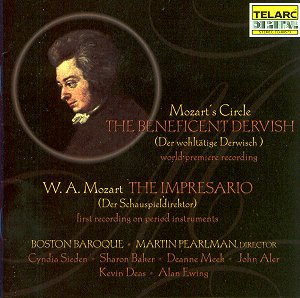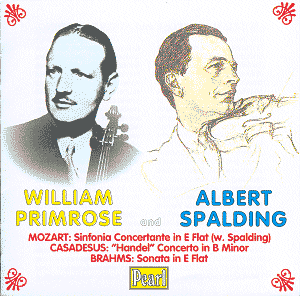 Composer: Wolfgang Amadeus Mozart
Composer: Wolfgang Amadeus Mozart
Works: The Impresario (Der Schauspieldirektor), The Beneficent Dervish (Der Wohltatige Derwisch)
Performers: Cyndia Sieden — soprano, Sharon Baker — soprano, John Aler — tenor, Kevin Deas — bass-baritone
Recording: Boston Baroque, Martin Pearlman, Recorded 1989
Label: Telarc CD-80573
Mozart’s “The Impresario,” composed in 1786 during the fruitful period surrounding “Le Nozze di Figaro,” stands as a curious artifact of operatic history, a singspiel that was birthed from an imperial competition between the composer and his contemporary Antonio Salieri. While often dismissed as “long, diffuse, and rather silly,” this work encapsulates the playful spirit of its time and provides fertile ground for exploring Mozart’s burgeoning mastery of musical characterization and dramatic irony. The context of its creation—a musical contest prompted by Emperor Joseph II—adds an intriguing layer, pitting two distinct operatic styles against each other, yet it is Mozart’s work that, despite its brevity, reveals a depth of compositional skill.
The performance by Boston Baroque under Martin Pearlman exhibits a commendable commitment to clarity and stylistic authenticity. The orchestra, while at times overpowering the vocalists, presents a lively interpretation of Mozart’s overture, which is surprisingly expansive and sets the stage with a grandiosity that belies the work’s modest scope. The opening measures brim with energy, and Pearlman’s direction brings out the rhythmic vitality inherent in the score. However, as the soloists navigate the intricate arietta, duet, trio, and vaudeville sections, the balance becomes precarious, occasionally drowning the nuanced vocal lines in orchestral exuberance. Cyndia Sieden’s soprano shines particularly in her arietta, where her clarity of tone and ability to convey character adds depth to the otherwise light-hearted narrative.
The recording quality is generally strong, yet it occasionally falters in achieving the ideal balance between voices and orchestra. The engineering, while clear, sometimes fails to allow the text to resonate fully, creating moments where the audience may lose the comedic nuances that are central to the work’s charm. This detracts from the overall experience, particularly given the importance of the dialogue in situating the music within its theatrical context. For those seeking a more integrated presentation, the Karl Böhm recording from 1974 remains a gold standard, coupling “The Impresario” with “The Magic Flute,” offering not only a richer auditory experience but also a deeper understanding of Mozart’s operatic evolution.
The second work on this disc, “The Beneficent Dervish,” composed by a member of Mozart’s circle, presents a stark contrast. While it carries the fairy-tale charm reminiscent of “The Magic Flute,” it ultimately lacks the sophistication and cohesion of its more famous counterpart. The vocal performances here are adept, yet the material itself often feels like a series of delightful, yet simplistic, vignettes rather than a fully realized narrative. The premiere recording showcases some engaging moments, particularly in the ensemble sections, but overall it reinforces the idea that while it offers a glimpse into the operatic milieu of Mozart’s contemporaries, it does not hold the same enduring relevance.
This disc, while not essential, provides an engaging exploration of two contrasting works within the operatic canon and an opportunity to appreciate Mozart’s artistic milieu. The performance of “The Impresario,” despite its balance issues, allows listeners to appreciate Mozart’s wit and inventiveness, while “The Beneficent Dervish” serves as an interesting, if not fully satisfying, companion piece. Collectively, these works underscore the vibrant operatic landscape of late 18th-century Vienna and highlight the unique position Mozart occupied within it.



